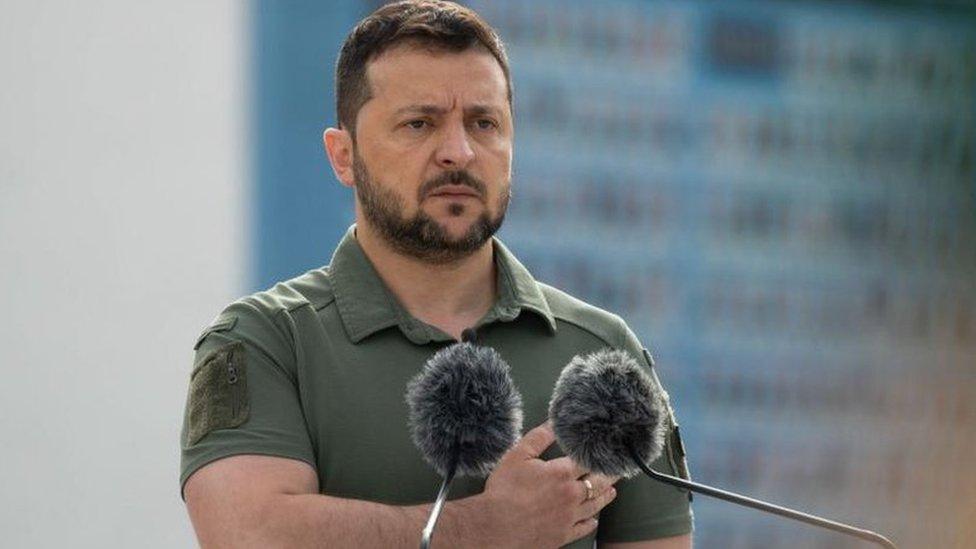Ukraine makes gains in its other war - fighting corruption
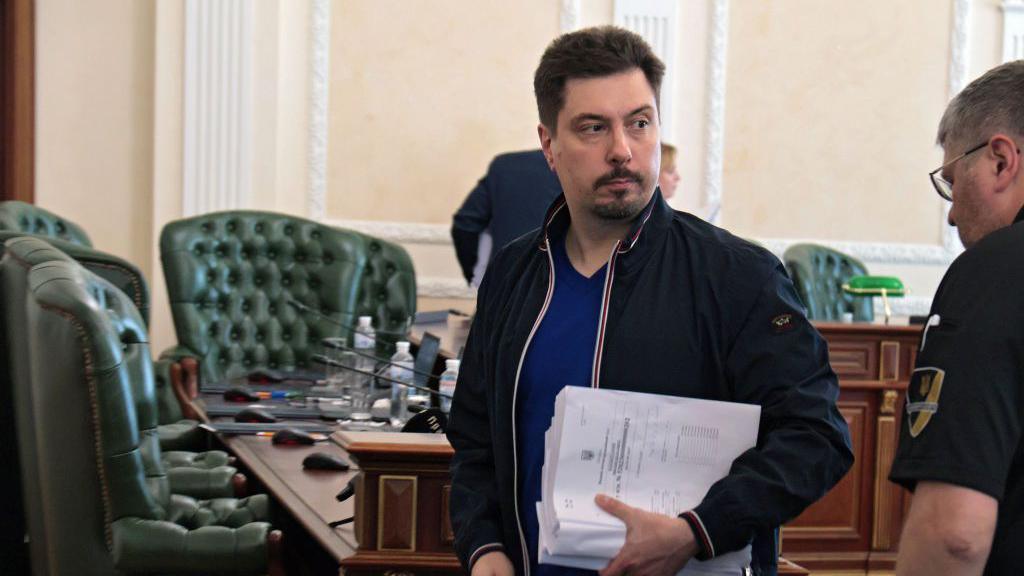
In May 2023, Ukraine detained former Supreme Court head Vsevolod Knyazev on bribery charges
- Published
Ukraine has battled endemic corruption since the first days of its independence in 1991, and government officials and independent campaigners alike say that fight is key to winning the existential war it is fighting with Russia.
They have had some success. Anti-corruption organisation Transparency International ranks Ukraine at its highest level since 2006: currently 104th out of 180 countries in its Corruption Perceptions Index.
"Most Ukrainian anti-corruption institutions are showing pretty good results," Andriy Borovyk, the executive director of Transparency International Ukraine, tells the BBC.
According to him, one such result is the arrest of the then-Supreme Court head, Vsevolod Knyazev, on bribery charges in May 2023.
"This can be a safeguard because if you see somebody arrested, you will think twice before doing something corrupt," he said.
There have been other high-profile arrests too, including agriculture minister Mykola Solsky and an officer with the SBU intelligence service, Artem Shylo.
All three deny any wrongdoing and have been released on bail. Investigations are ongoing.
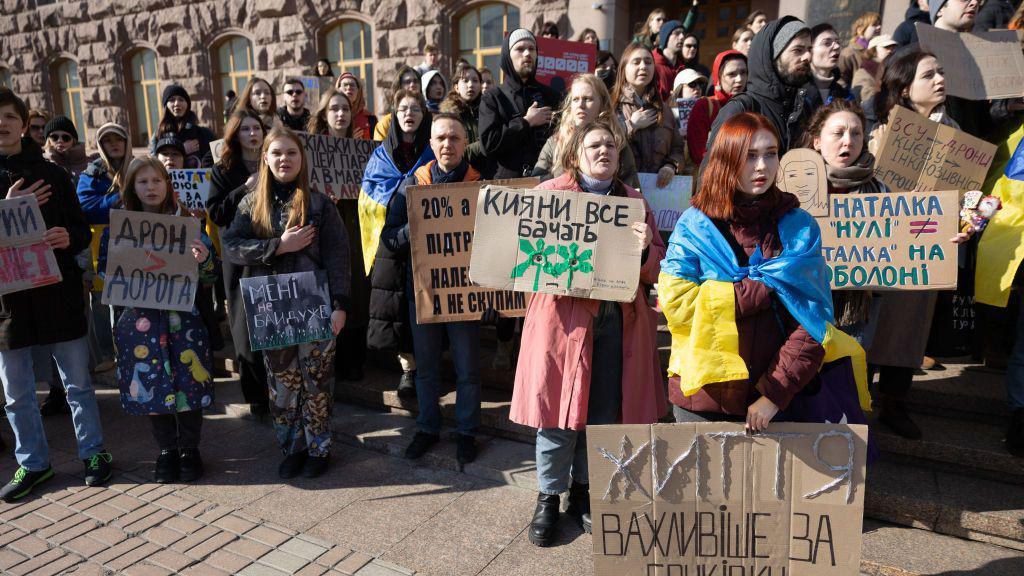
Protests in Kyiv have denounced corruption and demanded more funding for Ukraine's armed forces
A key milestone came in 2015, when a digital platform called Prozorro helped slash corruption in government procurement, saving Ukraine almost $6 billion (£4.7bn) in public funds in just four years.
Ukraine’s task now is to focus on rooting out corruption in its tax and customs services, as well as improve financial oversight, says Mr Borovyk.
"A lot of money is coming to Ukraine from the West, and of course they are asking whether there is proper control over this money,” he adds.
In addition to sapping Ukraine's meagre resources, corruption has in recent years hampered the flow of foreign aid. Donald Trump cited corruption concerns when challenged about delaying assistance to Ukraine when he was US president.
Corruption has also been a major obstacle to recruiting more men for the war with Russia. Last year President Volodymyr Zelensky sacked all regional officials in charge of military conscription amid bribery concerns. Thousands of Ukrainians also bribed their way out of the country to avoid being sent to the war.
'Better at doing our job'
Andriy Synyuk, deputy head of the Specialised Anti-Corruption Prosecution Service, argues that frequent reports of Ukrainian officials being accused of corruption are a welcome sign.
"This doesn’t mean that more crimes are being committed. This means that we've become better at doing our job," he says.
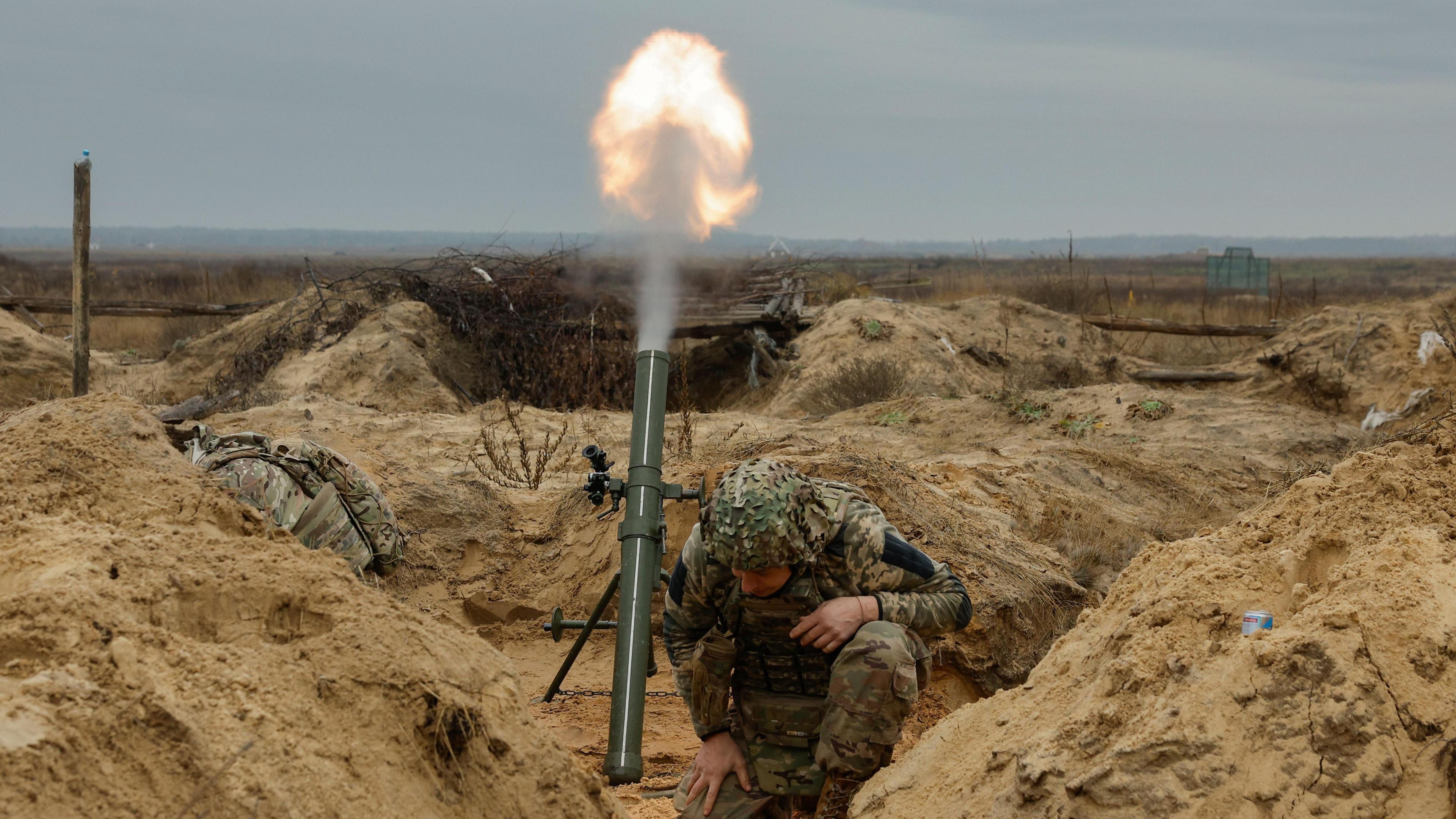
In January, Ukraine discovered uncovered corruption in the purchase of mortars for the army
"There aren't any people or positions left in Ukraine that anti-corruption agencies cannot touch," he tells the BBC. "This is probably our main achievement because we couldn't even dream of it a few years ago."
Dmytro Kalmykov, the head of the anti-corruption policy department at the National Agency for Preventing Corruption, a government agency, says graft has been all but exterminated in some of the worst affected areas - for instance, government services such as issuing passports, permits and licences.
He also tells the BBC that significant progress had been made in reforming education and police.
Problem areas
Mr Kalmykov admits, however, that the government has been less successful in eradicating corruption in using natural resources (e.g. in mining and forestry), regulating monopolies and in large infrastructure projects.
"Progress has been slowest where big interests and big players meet," he says.
According to him, "in the next five-ten years the government should focus on cleansing the judiciary, which will make the general system of public administration healthier".
Anti-corruption campaigners agree that the Ukrainian government has become much more active in fighting corruption.
"Something clicked in their heads last winter, their attitude has really changed, importantly it did at the very top," says prominent Ukrainian anti-corruption journalist Yuri Nikolov.
"Perhaps they realised things were going pear-shaped", or the government in Kyiv may have come under pressure from Western donors, Mr Nikolov tells the BBC.
The fact is, he goes on, "law-enforcement have stepped up their game".
Demand for change
So what is driving Ukraine's anti-corruption push?
Vitaly Shabunin, board chairman of the Anti-Corruption Action Centre, a Ukrainian NGO, believes it is a combination of pressure from the Ukrainian public and foreign donors.
"Regardless of whether or not the government wants to fight corruption and regardless of who is in the government, public pressure and the effectiveness of civil society and media means than no government can ignore corruption," he says.
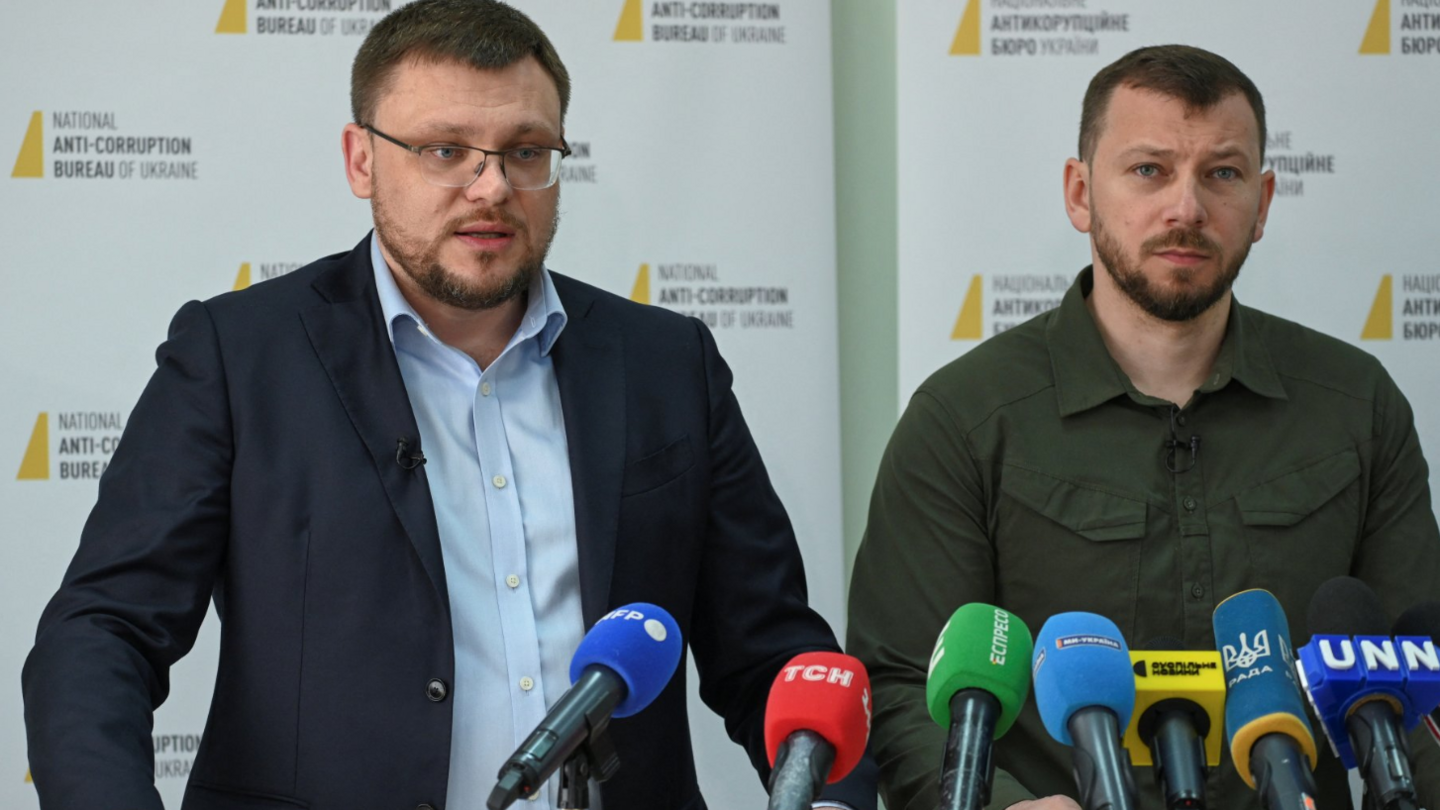
Ukraine's National Anti-Corruption Bureau are optimistic about their drive to clean up graft
As an example, he mentions a reshuffle of Ukraine’s government in 2023 which followed allegations of defence officials procuring food supplies for the Ukrainian army at inflated prices.
"The scandal launched institutional changes in defence procurement which means that there will be no corruption there even after the minister changes," he tells the BBC. "Corruption scandals may force state institutions to change for the better."
Mr Shabunin dismisses concerns that Western military assistance to Ukraine can be embezzled. "All weapons supplied by Western allies end up in the hands of Ukrainian troops who use them effectively. It is impossible to steal Western weapons."
But experts say the Ukrainian government needs to do more to stamp out corruption. This is particularly important at a time of war, Mr Nikolov says.
"Corruption is killing us. If you want to be left without any ammunition at all, if you want to be left without money to buy ammunition with, if you want to welcome occupiers to Kyiv, then yes, turn a blind eye to corruption. But trust me, the first thing they'll do once we're occupied, is they'll shoot us all. That's why fighting corruption is a matter of survival."
Related topics
- Published21 December 2023

- Published2 May 2024
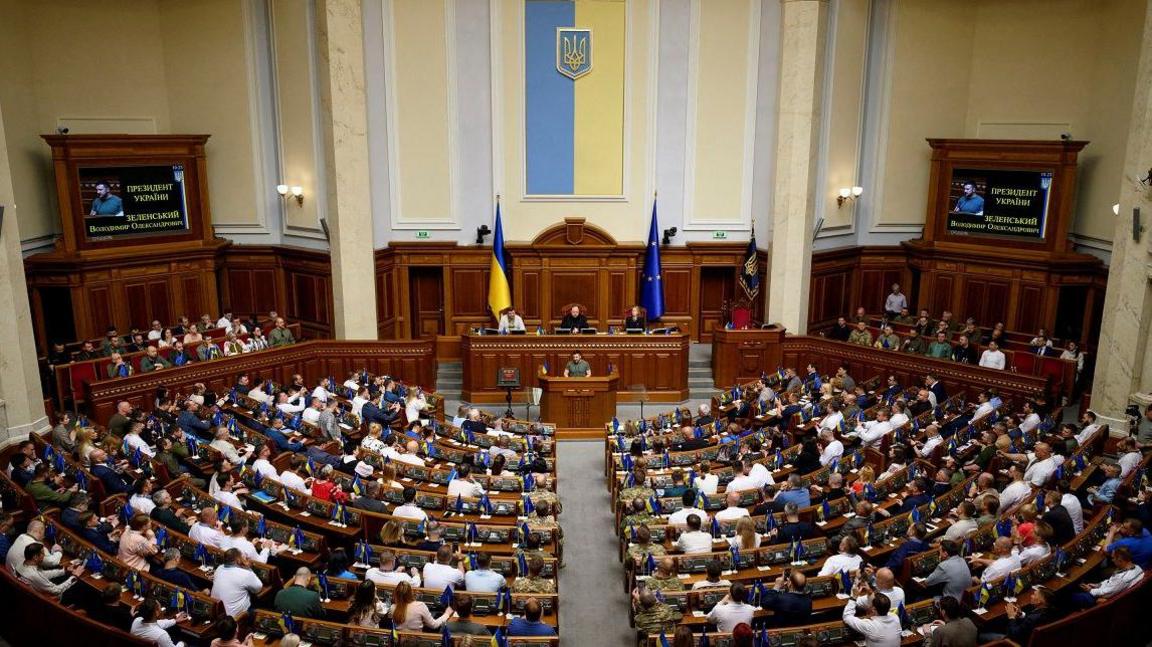
- Published11 August 2023
